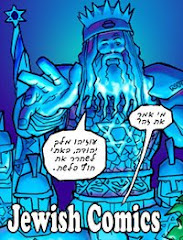Some of the articles mention or compare his book to Rabbi Simcha Weinstein's Up Up, and Oy Vey!: How Jewish History, Culture, and Values Shaped the Comic Book Superhero.
Douglas Wolk's "Just Plain Super" argues that both books are trying too hard to Judaize superhero characters who clearly aren't.
Weinstein’s book, in particular, indulges in far-fetched exegesis ... Fingeroth, at least, notes that the themes he’s hunting for are mostly “unconscious and subconscious” on the part of comics creators.
Amy Gluth wrote a review for Jewcy :
I went into Disguised As Clark Kent thinking it would be about the same book as Up, Up And Oy Vey!: How Jewish History, Culture, and Values Shaped the Comic Book Superhero by Simcha Weinstein (Oy Vey is jokier and with more Biblical parallels tossed in), but, despite having nearly the same title and subject, Disguised, I have to admit, is really the leader on the topic with greater contemporary historical detail and wonderful captured social and emotional subtleties. At least in my humble little opinion, it seems to be about Jews first, particularly the immigrant Jewish psyche, and comics we drew second.
Jack Fishel, editor of the forthcoming (Encyclopedia of American Jewish Popular Culture) wrote a review for The New Jersey Jewish News :
a plethora of books have recently appeared that explore the Jewish origins of the comic-books creators. Among the better studies are Up, Up and Oy Vey! How Jewish History, Culture, and Values Shaped the Comic Book Superhero by Rabbi Simcha Weinstein (Leviathan Press) and, now, Fingeroth’s latest work.
In Jennifer M. Contino's interview with Fingeroth (for The Pulse, reprinted at comicon.com), he lists Rabbi Simcha's book as one of his sources for material :
I interviewed some fascinating Jewish comics creators including Stan Lee, Irwin Hasen, Joe Kubert, Jerry Robinson, Jules Feiffer, Neil Gaiman, Brian Bendis, and the late Arnold Drake. Aside from that, Arie Kaplan’s, Simcha Weinstein’s, Jules Feiffer’s, and Gerard Jones’s writing on the topic was very helpful. And thanks to the Internet, I was able to read dozens of articles and essays from all over the world about related topics.
Forbes.com conducted an e-mail interview with Fingeroth :
stories about such topics as--especially in post-Holocaust comics--characters who were survivors of one form of tragedy or another--indeed, the 1950s-and-beyond emphasis on Superman’s status as a survivor of the doomed planet Krypton--echoed what was going on collectively in the minds of Jewish Americans. ”Why did I survive, and not my cousins in Europe?” and so on. The whole point of Disguised as Clark Kent is to explore the nooks and crannies where ethnic identity may have crept into the work when no one--including the writers and artists--was conscious that it was
Jason Berek-Lewis interviewed Rabbi Weinstein for Broken Frontier and discussed the book in the column he wrote a week earlier.
pastordan reposted the press release from State of Belief which was promoting the then-upcoming show (May, 2007) in which Rev. Dr. C. Welton Gaddy interviewed the "Comic Book Rabbi," Simcha Weinstein.
Sean Kleefeld provided a brief review at his blog :
The book wasn't bad at all. My biggest complaint was really that it didn't have enough weight to it; I think a lot more could have been done with the subject matter. Perhaps it's because I've done so much reading on these creators and characters already that I'm far too familiar with the material. This might well be wholly new for many people and, if you didn't know that Bob Kane or Stan Lee were Jewish, this is probably an excellent book to introduce you to those ideas. But it really strikes me as a more introductory text than what I'd be looking for and I have to admit some disappointment with it because of that.
The Jewish Life provides a brief glance at the book with several excerpts from it.
Finally, for those of you who missed Rabbi Simcha's interview on CNN, here's the YouTube video, courtesy of wadeisdead (thanks also go out to the Gruntig blog for pointing it out).
You may read the transcript at http://transcripts.cnn.com/TRANSCRIPTS/0606/19/sbt.01.html (scroll down)







1 comment:
You might enjoy this Mr. Media podcast interview with cartoonist Jules Feiffer, who talks about the new collection of his comic strips from the Village Voice, getting his start with Will Eisner on The Spirit, his plays (Little Murders), his movies (Carnal Knowledge, Popeye), the Disney musical adaptation of The Man in the Ceiling, and his forthcoming memoirs.
Post a Comment